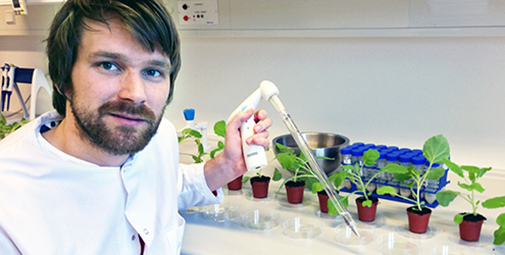Center for Synbio Scientist Finalist in PhD Cup
Today, the finalists of this year's Brain Championships - the Phd Cup- have been published, and amongst them is postdoc Johan Andersen Ranberg from Center for Sythetic Biology. He will now compete with seven others to be crowned best in the country at communicating their Phd. research.
The competition takes place on April 16th and will be broadcast on DR2 on April 18th.
Read more about the competition here.
DR News has reported on the PhD Cup. Read the article here.
More about the competition can be read in Information's March 27th printed newspaper.
3 years in 3 minutes
On April 16th, Johan will stand on DR Concert House's Studio 2 stage, and boil three years' research down to three minutes worth of sharp and engaging science communication. You can read more about his expectations, below.
You can also read more about his research here

Why did you decide to enter the PhD Cup?
When I was in the audience for the PhD Cup final 2013, I became curious about the communication tools which the participants used. As a finalist myself, I’ve now received coaching from rhetoricians, psychologists and lots of other skilled people. I've learned a lot from that.
If we scientists could get better at explaining our research, and stimulate people’s natural curiosity, it would hopefully create more nuanced discussions about scientific topics which have a crucial impact on people’s everyday lives.
What is the most important thing for you to communicate?
That science today isn’t dominated by eccentric old men who sit alone in their laboratories until they have the solution to all the world’s problems. Nowadays, science is a team sport which requires collaboration and that we work together to create an inspiring research environment.
I could never have achieved all these great results without close collaboration with my excellent colleagues.
You call scientists ’rock stars’. What do you mean by that?
Musicians are dependent on their bandmates in order to get the best results and often talk about getting ‘high’ from the harmony created when they play. That’s how it is in a research group too when, after a lot of work, you get a breakthrough. None of the scientists involved could achieve those results alone – only together can we succeed in getting that unique result which contributes to a greater understanding of the world we live in.
How is your research going to make a difference in the world?
During my ph.d., I worked with plants which contain natural substances that we use in everyday life, e.g. in medicine, as food ingredients, and in the cosmetic, colour and scent industries. By understanding how plants produce them, we can develop more sustainable production methods which can counteract environmental exploitation. For example, can we produce medicine in the same way as we brew beer?
In the longer term, we can develop production so that it can be carried out in green organisms such as algae. They use exclusively sunlight and CO2 to grow and produce the natural substances we need. This would lighten the negative impact of CO2 on the environment and provide us with the substances we would like.
How will participating in the PhD Cup benefit your research career?
First of all, it creates awareness of the research area which I work with, and maybe attention from the the foundations which grant money to Danish research. The project will be presented in a professional TV programme, which will hopefully be seen by a lot of people – last year there were almost 100.000 viewers.
Hand on heart, I don’t think that many of the scientific articles produced by Danish universities are read by the same number of people.
What are the disadvantages of participating in the PhD Cup?
My experience so far is that there is a lot of focus on me as a person. Since I’d rather talk about great science, it can be a bit distracting to have to talk about yourself. It ought to be irrelevant for the science I’m talking about.
But I understand that it’s people who capture viewers attention, and that’s why it’s something that DR and the newspaper Information use in their TV clips and news articles.
What is the PhD Cup?
The PhD Cup is a collaboration between Information, DR, Danish Universities and the Lundbeck Foundation.
The candidates are selected through a strict procedure, where each Danish University recommends eight researchers based on an internal competition. From these, an external judging committee selects the 8 finalists.
The finalists from UCPH this year was: Johan Andersen-Ranberg from Center for Synthetic Biology, Department of Plant and Environmental Sciences and Asger Wingender from Department of Economics.
Watch the Competition
Audience tickets are sold out but the show will be broadcast on DR2 on April 18th at 20:00.
Contact Johan
joar@plen.ku.dk
+45 35 33 33 01
Johan is part of Center for Synthetic Biology, the Plant Power Project and Department of Plant and Environmental Sciences.
Good Science Communication
Johan reccommends:
- The film Particle Fever. The film can be found on Netflix
- Hans Rosling's TED talks
- Great Danish scientists
